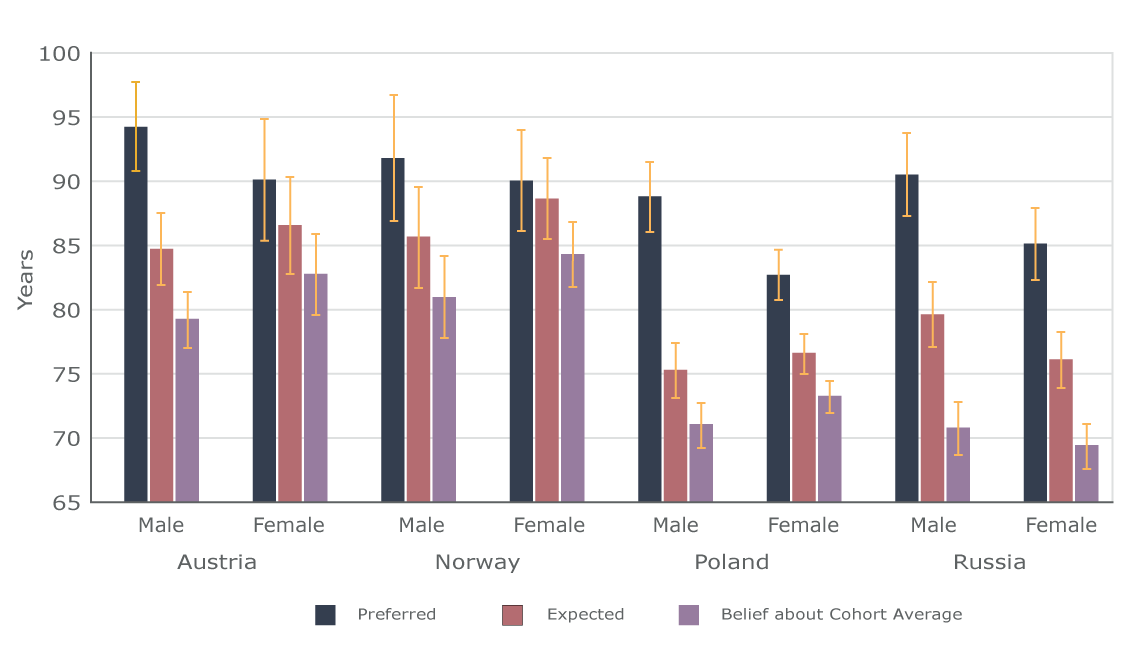Our lives are getting longer and longer – are we perhaps living “too long”? So far, little is known about how long people want to live, and most of the few existing studies have focused exclusively on middle-aged and older adults. Young adults are expected to live even longer than current generations, and they are also in the midst of making a number of decisions and establishing behavioural patterns that will dramatically affect their future development and health. It is therefore important to understand how long particularly young people want to live, why some young people want to live longer than others, and what the consequences of wanting to live shorter or longer lives might be.
To address the lack of research on how long young adults want to live, Catherine E. Bowen, Solveig Glestand Christiansen, Anastasia Emelyanova, Elena Golubeva, Marcin Stonawski and Vegard Skirbekk conducted a survey of over 700 university students in Austria, Norway, Poland and Russia. They asked students how long they want to live (preferred life expectancy), how long they expect to live (subjective life expectancy) and how long they think an average person of the same age and sex will live (belief about average cohort life expectancy). In total, they interviewed 715 students. Participants were on average 22 years old and a slight majority were women (58.3%).

Figure 1: How long participants want to live compared with how long they expect to live and how long they believe that an average person of their age and sex will live by country and gender.
The researchers found that one-fifth of participants (21.2%) wanted to live for fewer than 80 years, while slightly more than half (53%) wanted to live to see their 80s or 90s, and one quarter (25.8%) wanted to live 100 or more years. In contrast to the stereotype that young people think that they will live forever, on the whole participants tended to in fact underestimate how long they will probably live relative to recent projections. The vast majority (over 85%) of participants wanted to live at least as long as they expect to live and at least as long as an average cohort member. The differences between how long participants want and expect to live were substantial: On average, participants wanted to live about eight years longer than they personally expect to live, and about 13 years longer than they believe that an average cohort member will live. Based on these findings, the authors concluded that there was no evidence that young people think that they will live “too long.”
The results also revealed a number of interesting country- and gender-differences. As displayed in Figure 1, the gap between how long participants wanted to live relative to how long they expect to live was especially large (circa 10 years) for participants in Russia and Poland, that is, the countries with the lowest period life expectancies in the sample. Furthermore, although women tend to outlive men, male participants wanted to live several years longer than female participants (M = 91.34 years versus 87.01 years, respectively). The magnitude of the gender gap in preferred life expectancy was similar across countries, despite the fact that the real-life gender gap in life expectancy in Austria, Norway, Poland and Russia varies quite a bit (e.g., a gender difference in period life expectancy of 4.1 years in Norway versus 11.4 years in Russia).
The results of the survey also point to potential antecedents and consequences of young adults’ preferred life expectancy. Particularly noteworthy is that how people think about old age appears to be an important predictor of how long they want to live, even in young adulthood. Intriguingly, participants who preferred to die before their 80th birthday were more likely to use tobacco daily and be completely physically inactive compared with their peers who wanted to live to their 80s or 90s.